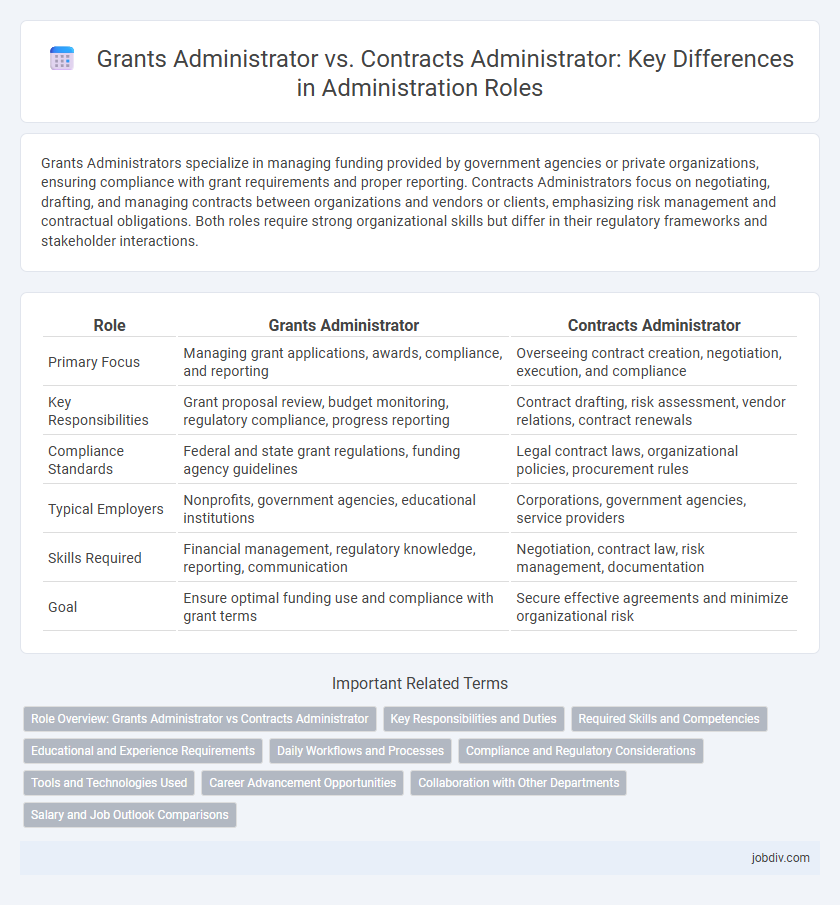Grants Administrators specialize in managing funding provided by government agencies or private organizations, ensuring compliance with grant requirements and proper reporting. Contracts Administrators focus on negotiating, drafting, and managing contracts between organizations and vendors or clients, emphasizing risk management and contractual obligations. Both roles require strong organizational skills but differ in their regulatory frameworks and stakeholder interactions.
Table of Comparison
| Role | Grants Administrator | Contracts Administrator |
|---|---|---|
| Primary Focus | Managing grant applications, awards, compliance, and reporting | Overseeing contract creation, negotiation, execution, and compliance |
| Key Responsibilities | Grant proposal review, budget monitoring, regulatory compliance, progress reporting | Contract drafting, risk assessment, vendor relations, contract renewals |
| Compliance Standards | Federal and state grant regulations, funding agency guidelines | Legal contract laws, organizational policies, procurement rules |
| Typical Employers | Nonprofits, government agencies, educational institutions | Corporations, government agencies, service providers |
| Skills Required | Financial management, regulatory knowledge, reporting, communication | Negotiation, contract law, risk management, documentation |
| Goal | Ensure optimal funding use and compliance with grant terms | Secure effective agreements and minimize organizational risk |
Role Overview: Grants Administrator vs Contracts Administrator
Grants Administrators manage the entire lifecycle of grant funding, including application review, compliance monitoring, and reporting to ensure funds are used according to federal or organizational guidelines. Contracts Administrators oversee the negotiation, execution, and management of contracts, focusing on legal compliance, risk management, and maintaining vendor relationships. Both roles require strong project management skills but differ in their emphasis on funding source regulation versus contractual obligations.
Key Responsibilities and Duties
Grants Administrators manage the entire lifecycle of grant funding, including application processing, compliance monitoring, budget oversight, and reporting to ensure adherence to funding agency requirements. Contracts Administrators focus on drafting, negotiating, executing, and managing contracts between organizations and vendors or clients, ensuring legal compliance and risk mitigation throughout contract performance. Both roles require detailed documentation, stakeholder communication, and regulatory knowledge, but Grants Administrators emphasize financial stewardship of awarded funds while Contracts Administrators prioritize contractual obligations and terms enforcement.
Required Skills and Competencies
Grants Administrators require expertise in financial management, compliance monitoring, and knowledge of federal and state funding regulations to ensure proper allocation and use of grant funds. Contracts Administrators must demonstrate strong negotiation skills, contract law understanding, and risk assessment capabilities to manage agreements effectively and mitigate potential liabilities. Both roles demand excellent communication, attention to detail, and proficiency in project management software for efficient administration.
Educational and Experience Requirements
Grants Administrators typically require a bachelor's degree in public administration, finance, or a related field, with preference for candidates possessing experience in grant writing, compliance, and fiscal management within nonprofit or government settings. Contracts Administrators often hold a degree in business, law, or contract management, complemented by experience in contract negotiation, risk assessment, and legal compliance in corporate or government procurement environments. Both roles benefit from certifications such as Certified Grants Management Specialist (CGMS) for Grants Administrators and Certified Professional Contracts Manager (CPCM) for Contracts Administrators, enhancing expertise and career advancement.
Daily Workflows and Processes
Grants Administrators manage funding applications, monitor compliance with grant conditions, and oversee budget allocations to ensure proper use of awarded funds. Contracts Administrators handle contract preparation, negotiation, and execution, ensuring legal compliance and managing amendments throughout the contract lifecycle. Both roles require meticulous documentation, stakeholder communication, and adherence to organizational policies to maintain accountability and efficient workflow management.
Compliance and Regulatory Considerations
Grants Administrators ensure strict adherence to federal and state funding regulations, focusing on compliance with grant-specific guidelines such as allowable costs and reporting requirements. Contracts Administrators handle regulatory considerations related to contract law, including terms enforcement, risk management, and adherence to procurement policies. Both roles require rigorous documentation and audit readiness to meet government compliance standards and organizational policies.
Tools and Technologies Used
Grants Administrators frequently utilize specialized software like Grant Management Systems (e.g., Fluxx, GrantHub) to streamline application tracking, compliance monitoring, and reporting. Contracts Administrators often rely on Contract Lifecycle Management (CLM) tools such as DocuSign CLM, Agiloft, and SAP Ariba to manage contract creation, negotiations, and renewals efficiently. Both roles leverage cloud-based collaboration platforms like Microsoft SharePoint and Adobe Acrobat for document management and workflow automation.
Career Advancement Opportunities
Grants Administrators often advance by specializing in federal or private funding compliance, moving into senior roles such as Grants Management Director or Compliance Officer with a focus on financial oversight and regulatory adherence. Contracts Administrators typically progress toward positions like Senior Contract Manager or Procurement Director, emphasizing negotiation expertise and strategic supplier relationships to optimize organizational contracts. Career growth in both fields relies on enhancing specialized knowledge, such as government regulations for grants or contract law for contracts, paired with leadership skills to manage complex administrative processes and cross-functional teams.
Collaboration with Other Departments
Grants Administrators collaborate closely with finance, compliance, and program departments to ensure proper allocation, reporting, and adherence to grant requirements. Contracts Administrators work alongside legal, procurement, and project management teams to negotiate terms, manage contract execution, and mitigate risks. Both roles require effective communication and coordination across multiple departments to optimize resource management and maintain regulatory compliance.
Salary and Job Outlook Comparisons
Grants Administrators typically earn median salaries ranging from $50,000 to $70,000 annually, with job growth projected at 5% over the next decade due to increasing government and nonprofit funding. Contracts Administrators command salaries between $60,000 and $85,000, benefiting from broader demand in private sector industries and a slightly higher job outlook growth rate of 6%. Both roles require strong organizational skills, but the Contracts Administrator position often offers higher earning potential and quicker employment expansion.
Grants Administrator vs Contracts Administrator Infographic

 jobdiv.com
jobdiv.com